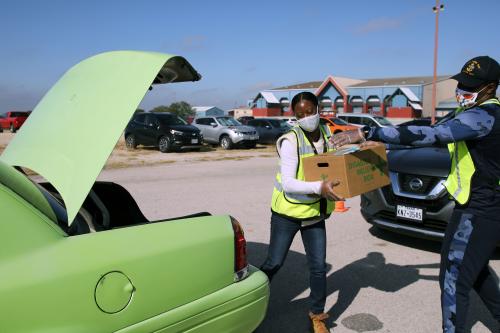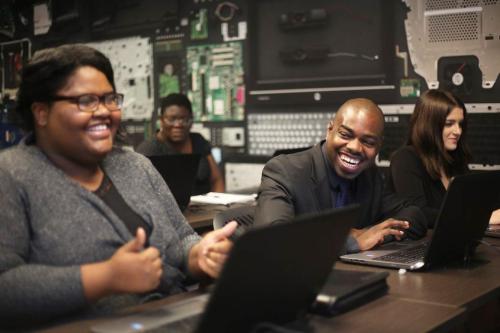Over the past year, two issues have erupted into the national consciousness: jobs and racial justice. As a result of George Floyd’s murder by white police officers and COVID-19’s trail of destruction (with job losses and illness hitting Black Americans especially hard), the U.S. is having a long-overdue reckoning with the consequences of a laissez-faire economic philosophy and a disingenuous commitment to colorblindness.
Now is the right moment for President Joe Biden and Vice President Kamala Harris to promote a mix of race-conscious and race-neutral reforms that set the stage for a more equitable economy. First, they should directly address the labor market’s well-documented racial discrimination by strengthening the Equal Employment Opportunity Commission. The administration should also act to broadly improve people’s working conditions and labor market prospects, which will in turn reduce racial disparities. These race-neutral actions include supporting worker power and helping young people navigate the obstacle course that is the transition from school to adulthood and a good job.
Fight discrimination by strengthening the Equal Employment Opportunity Commission
Black workers face undeniable discrimination in the labor market. An analysis of racial discrimination in hiring since 1990 found the “magnitude and consistency of discrimination” to be a “sobering counterpoint” to more optimistic assessments about the declining significance of race. Racial discrimination manifests itself in the assignments workers are given and the ways their performance is judged and rewarded, which in turn affects career progression. And job seekers with stereotypically “Black” names on their resume are less likely than those with “white” names to get callbacks from employers, even when they have similar qualifications.
Not surprisingly, then, Black workers earn less than white workers—a gap that cannot be fully explained by differences in education, age, industry, or region. Meanwhile, the federal Equal Employment Opportunity Commission does not have the funding, staff, or political clout to fulfill its mission of enforcing the law against employment-related discrimination and holding bad actors accountable.
The first step, therefore, is to increase funding for the agency so it can sufficiently investigate the discrimination complaints it receives. The second is to make sure it has the tools it needs for the job at hand, such as adequate data on compensation by race and gender.
Support worker power through collective bargaining at the industry level
The COVID-19 recession is remarkable not only for the sheer scale of job losses, but for how clearly it showed that millions of workers lack basic workplace protections. In the midst of a pandemic, many workers face unsafe working conditions and lack access to personal protective equipment. Those without paid leave who cannot telework face a stark choice: go to work and risk infection or stay home and lose their paycheck. These wrenching challenges are widespread, but disproportionately affect Black and Latino or Hispanic workers.
Strengthening unions and collective bargaining can be a solution to these issues. While unions have their own history of racial discrimination, they are now more racially integrated and benefit workers of all races and ethnicities. Collective bargaining through unions reduces wage disparities overall and by race and gender (and as unions have declined, wage inequality has grown). Benefits of unions go beyond bread-and-butter economic issues and affect attitudes as well: A recent study found that union membership reduced racial resentment among white workers.
But current labor law is rooted in discrimination. The New Deal excluded domestic and agricultural workers (dominated by women and Black people) from worker protections in order to gain support from white Southern lawmakers. Labor law badly needs a do-over, and a key component is reconceptualizing collective bargaining so that workers have more leverage to negotiate wages and other terms of their working conditions.
Right now, collective bargaining takes place at the firm level, which favors employers in a multitude of ways and structurally cannot address subcontracting, franchising, and independent contracting. The Biden administration should push for changes in labor law to allow for sectoral bargaining, in which workers organize by industry. This will bring more workers into the collective bargaining unit, and by including all firms, it ensures that individual firms that raise wages would not be at a competitive disadvantage.
Help young people by providing stronger guardrails in the school-to-work transition
Each year, the United States sets up millions of young adults to fail. These are disproportionately Black and Latino or Hispanic young adults, but plenty of white ones too. The paradigm of completing high school, attending college full time, gaining relevant work experience and contacts along the way, and then stepping onto the first rung of a career ladder may be possible for some young people, but certainly not all.
Even as high school graduation rates are on the rise, 15% of all public high school students do not reach this milestone, with Black and Latino or Hispanic students overrepresented in this group. For students in a substantial number of low-performing high schools, graduating on time is a 50-50 proposition.
About two-thirds of high school graduates immediately enroll in college—but enrolling is not the same as being prepared for or completing college. Among full-time students, six out of 10 earn a credential within four years. Completion rates are lower for Black and Latino or Hispanic students (42% and 50%, respectively), which is not surprising given that they disproportionately enroll in open- and broad-access colleges, which have much smaller budgets for instructional costs than more selective colleges.
Meanwhile, we are watching in real time as COVID-19 disrupts young people’s education and employment experiences, casting a long shadow over their future prospects. Unemployment among all young adults ages 20 to 24 was considerably higher in the fourth quarter of 2020 compared to the same period in 2019, reaching 16% among Black young adults and 8.8% among white ones.
Pre-pandemic, 17% of Black young adults ages 20 to 24 were disconnected from school and work, compared to 7% of white young adults. With school enrollment down and unemployment up since the pandemic began, disconnection rates are also up, and by one estimate may account for 25% of all young people.
For both individuals and the broader economy, it is better to prevent disconnection from the labor market and productive activities in the first place, or to shorten such periods of disconnection if prevention is not possible. One powerful approach is to enlist young people in meeting urgent community needs while offering them paid work combined with mentorship, education, training, and scholarships. These programs can employ young people from all educational backgrounds: those who left high school without a diploma, high school graduates who did not attend or complete college, and college graduates. Such programs already exist—think of YouthBuild, conservation corps, AmeriCorps, and many others—but they operate on a fairly small scale.
Even in the best of times, there is no shortage of socially useful work to be done—and these are not the best of times. Young adults can offer tutoring and enrichment activities for pre-K-12 students, assist with computer access and digital literacy efforts, carry out public works and environmental restoration projects, and contribute to a myriad of other efforts, limited only by the imagination of community leaders. Such experiences would provide an avenue for young people to support themselves financially, carry out meaningful and productive work, learn new skills, expand their networks, and reduce financial barriers to postsecondary education.
Making good on the promise of equality
As a country, we cannot fail in the crucial task of providing equal opportunity for all. The above strategies can help the U.S. meet the obligations of the promissory note Martin Luther King, Jr. referenced in his “I Have a Dream” speech: that Black people have equal claim to the rights of life, liberty, and the pursuit of happiness as white people. The payment is overdue, and we must act now.
The Brookings Institution is committed to quality, independence, and impact.
We are supported by a diverse array of funders. In line with our values and policies, each Brookings publication represents the sole views of its author(s).







Commentary
Three ways the Biden administration can promote economic security for Black Americans
February 12, 2021